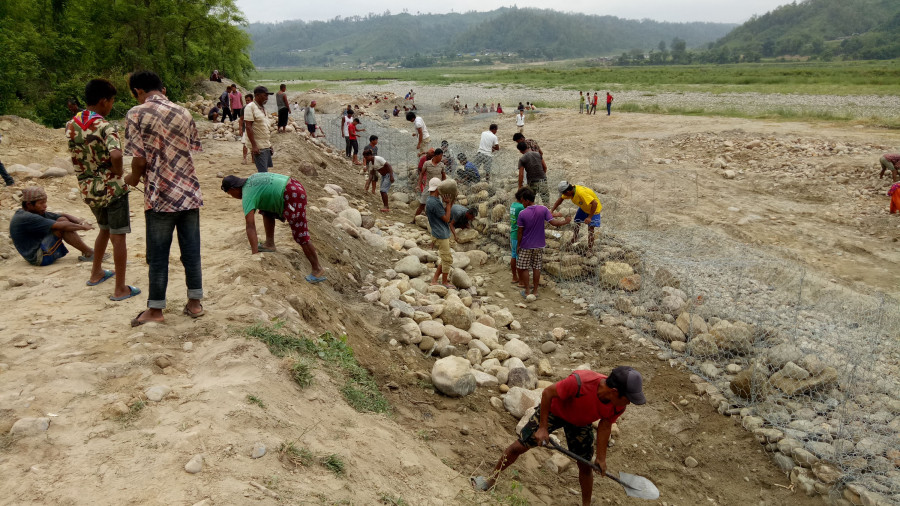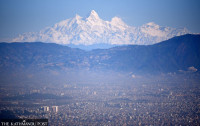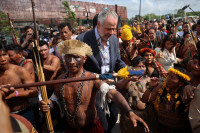Climate & Environment
Nepal receives first-ever climate change project grant from Green Climate Fund
The fund will extend $39.3 million for building resilience of Chure region.
Chandan Kumar Mandal
Nepal has secured its first significant funding from the Green Climate Fund (GCF) for a project aimed at helping the country adapt to the adverse impacts of climate change.
The 24th board meeting of the fund in Sangdo, South Korea on Wednesday approved the first funding proposal of Nepal—one of the most vulnerable countries to the impacts of the climate crisis.
The meeting has given the green signal to awarding a $39.3million grant to the project titled ‘Building Resilient Churia Region in Nepal (BRCRN)’.
Set up in 2010 under the United Nations Framework Convention on Climate Change (UNFCCC), the Green Climate Fund (GCF) was created to support the efforts of developing countries to respond to the challenge of climate change.
According to Raju Pandit Chhetri, a climate change activist and executive director of Prakriti Resources Centre, an NGO working for sustainable development and environmental justice in Nepal, this is the first-ever that the GCF has extended such substantial funding to the country for climate change-related projects.
“In the past, we have achieved some funds from the GCF, but this is the first time the fund has approved Nepal’s funding proposal. This is an important achievement for the country," Chhetri, who has been involved in international climate negotiations for years, told the Post from Songdo, South Korea.
Nepal had also received fundings from the GCF twice in the past. In 2016, under the GCF's Readiness and Preparatory Support Programme, a programme to enhance country ownership and access to the funds, Nepal had received a grant of $2.9 million via the United Nations Environment Programme for preparing its National Adaptation Plans (NAPs), also known as Asia’s first GCF-financed project at the time.
Likewise, Nepal received another funding from GCF’s Readiness Support that provides up to $1 million per country per year for strengthening the country’s institutional capacities to access the funds.
“Approval of funding for the project for climate actions is a positive development for a climate change vulnerable country like Nepal,” Pragyajan Yalamber Rai, project manager of GCF Readiness and Preparatory Support Programme under the Ministry of Finance.
The current funding has been approved for the project which will be implemented on the ground to help climate-vulnerable communities and ecology to adapt, according to Chhetri.
The Food and Agriculture Organization will implement the approved project, in partnership with the Ministry of Forest and Environment, in the fragile Chure range which has faced massive degradation in the past. The project will last for seven years.
“We all are aware of the vulnerability of the Chure range and its degradation over the years. The Chure range is a significant zone for the people living in the low-lying districts in Tarai for its services like water, forest among others,” said Rai. “The approved project is a multi-dimensional one as it not only talks about the resilience of vulnerable communities and conservation but also early warning systems. It will help locals in adapting to the changing climate.”
In recent years, Nepal has fallen into the list of countries that are facing the brunt of a changing climate and its associated impacts despite doing little in the past or present to amplify global warming. Nepal is one of the fourth most vulnerable countries in the world in terms of climate change effects which are already evident in various sectors.
As a poor and mountainous country, at the higher risk of climate change and induced disasters, Nepal looks up to international support for climate actions—adaptation and mitigation—in order to gain resilience.
“Approval of the first such project has paved the way for the country to access climate finance,” said Rai. “This has given the country with much-needed confidence that we can do more in the future.”
There are at least three projects in the pipeline for accessing grants from the GCF.
WWF Nepal has been working on a project proposal which will be based in West Seti area. Likewise, the UNDP Nepal is working on a project proposal to safeguard lives and livelihoods against the project to protect lives and livelihoods against flood and glacial lake outburst floods (GLOFs) targeting finance from the Green Climate Fund.
International Union for Conservation of Nature-Nepal is also developing a project proposal for building ecosystem and community resilience which is likely to be submitted for approval in coming March—the first one to go for approval among others in the pipeline, according to Rai.
However, these all are international agencies-supported projects. Accreditation of Alternative Energy Promotion Centre, one of the four national entities nominated by the government in February to gain the GCF status, in February has given new hopes for the country that the government bodies can also apply for similar grants for climate actions projects.
The GCF accreditation to the AEPC means it can access up to $50million in GCF funds for low-carbon, climate-resilient development projects and programmes in Nepal.
“Funding approval has opened new avenues for the country for climate actions be it adaptation or mitigations,” said Chhetri. “What is important now is how we effectively utilise the money and use it for making communities climate resilient at the ground level. Learning from this project will help in securing other project fundings.”




 22.37°C Kathmandu
22.37°C Kathmandu











